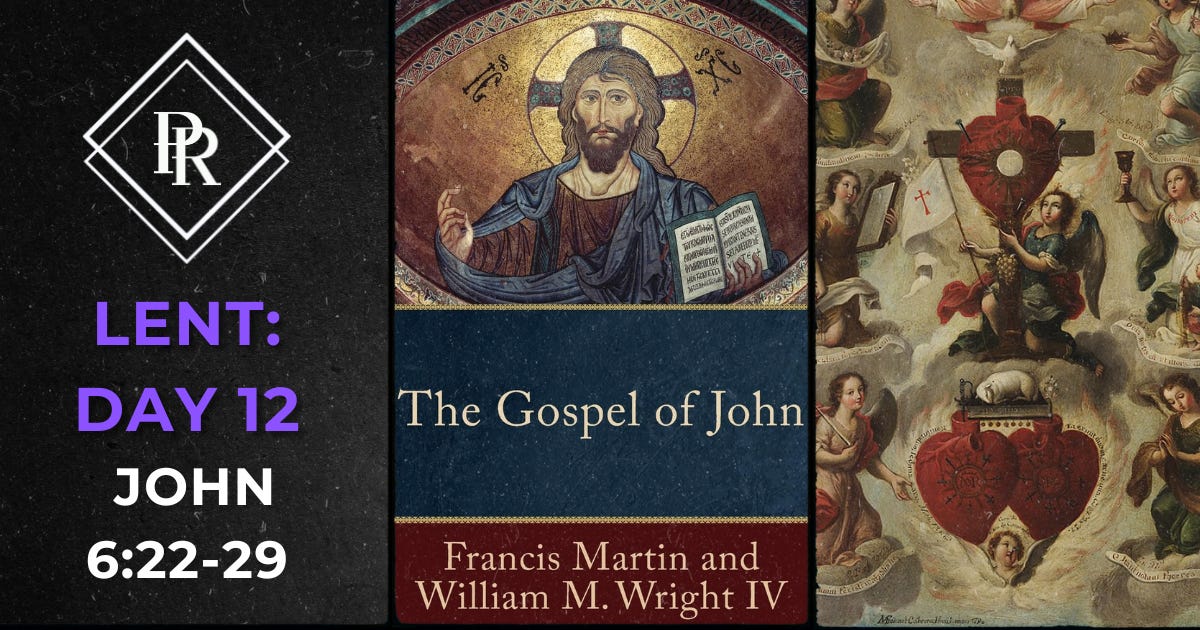“Do not work for food that perishes but for the food that endures for eternal life…”
— John 6:27—
When I first heard about the idea that scripture was perspicuous, that is lucid or clear, I thought this was obviously false since there are so many odd passages in the Bible. My personal favorite to cite on the issue of textual obscurity is Exodus 23:19: “Do not cook a young goat in its mother’s milk.” But the apologists of scriptural perspicuity will say, “Well, those verses are not necessary for salvation. But the passages about salvation, those are clear.” The passages we are about to go through this week — John 6 — demonstrate this is not the case.
One such passage is John 6:27. The people have followed Jesus across the sea and are ready for their next meal. Jesus says,
“Amen, amen I say to you, you are looking for me not because you saw signs but because you ate the loaves and were filled. Do not work for food that perishes but for the food that endures for eternal life, which the Son of Man will give you…”
— Jn. 6:26-27 (emphasis added)
This passage is not clear. The audience is as perplexed as we are. They respond, “What can we do to accomplish the works of God?” To which Jesus replies,
“This is the work of God, that you believe in the one he sent.”
— Jn. 6:29
As we enter into the rest of John 6, we will see that this is not merely belief in Jesus as our Savior but also Jesus as the Truth. Today, many Christians presume that to fulfill Jesus’ requirement for belief is simply to say or think the proposition, “I believe in Jesus” or “I believe Jesus is Lord of my life.” However, Jesus is not just asking them to believe that he existed or that he was a good teacher, but that his words were the “words of life.”
Many Christians treat scripture as if it is some divinely inspired “cognitive-behavioral” handbook, where the scripture acts as a psychological corrective that leads to better behavior and, ergo, better societies. But while this may be an effect of the scriptures, that is, curbing one’s illicit and immoral behaviors, studying and knowing scripture alone is not sufficient for salvation — John 5:39: “You search the scriptures because you think you have eternal life through them…”
It is not enough to merely believe or study the Bible really hard. We must also receive Christ into our bodies and souls, a practice that goes back to the first century of the Church. This is the work of God in us, that he moves us to receive Christ in the bread and wine on the altar. Christ’s body is “true food,” and his blood is “true drink.”
This is why the Catholic teaching is the teaching on the Eucharist. All other forms are incomplete expressions or half-truths of the full truth that is mandated by Christ and his Church.
Finally, one of my subscribers commented on my content recently and cited passages from the Catechism of the Catholic Church (CCC) about Baptism being valid among other denominations. This is true.
The Catechism says that the baptismal rites of other Protestant denominations are valid and that it puts the believer into an “imperfect” communion with the Church. But Protestants should be wary to read this from their doctrinal commitments like predestination or “once saved always saved” as if they now have insurance through two different providers.
According to the Catechism, citing the Council of Trent, it states:
Penance has rightly been called by the holy Fathers “a laborious kind of baptism.” This sacrament of Penance is necessary for salvation for those who have fallen after Baptism, just as Baptism is necessary for salvation for those who have not yet been reborn.
— CCC. 980.
The above quote is important because Protestants can still commit mortal sin. I had a friend tell me once that he agreed with the Catholic belief that sterilization was a frustration of the telos, that they were correct about the philosophical issues at play, and that he was going to go through with it anyway. If he does, he will need the Sacrament of Penance to heal that mortal wound. Hence, the Church teaches,
The authority of the Magisterium extends also to the specific precepts of the natural law, because their observance, demanded by the Creator, is necessary for salvation.
— CCC. 2036.
Finally, the Catechism states that salvation comes through the “sacraments of the New Covenant.”
The Church affirms that for believers the sacraments of the New Covenant are necessary for slavtion.
— CCC. 1129. (emphasis in original).
Some may say, “This is harsh!” But every denomination out there believes that if a doctrine is a teaching of Christ himself, and the person rejects that or deliberately disobeys it, they have either fallen away from the faith or were never saved in the first place. In the end, scripture is perspicuous on the nature of salvation, but only if you're Catholic.
— DR



I meant to get back to you sooner on your response to my previous comment.
Here I’ll just offer that it’s not clear that someone who doesn’t believe that sins can be mortal can commit a mortal sin. That something is serious and immoral seems insufficient to create the condition, the person, even if they are Catholic, has to believe that what they propose to do will cut them off from the Divine Life. Or so I have heard from knowledgeable Catholics.
As for your other citations from the Catechism, I don’t see how they can be applied to Protestants without negating the passages in their favor elsewhere. One, or the other must be ultimately true of them and the other false, or not applicable.